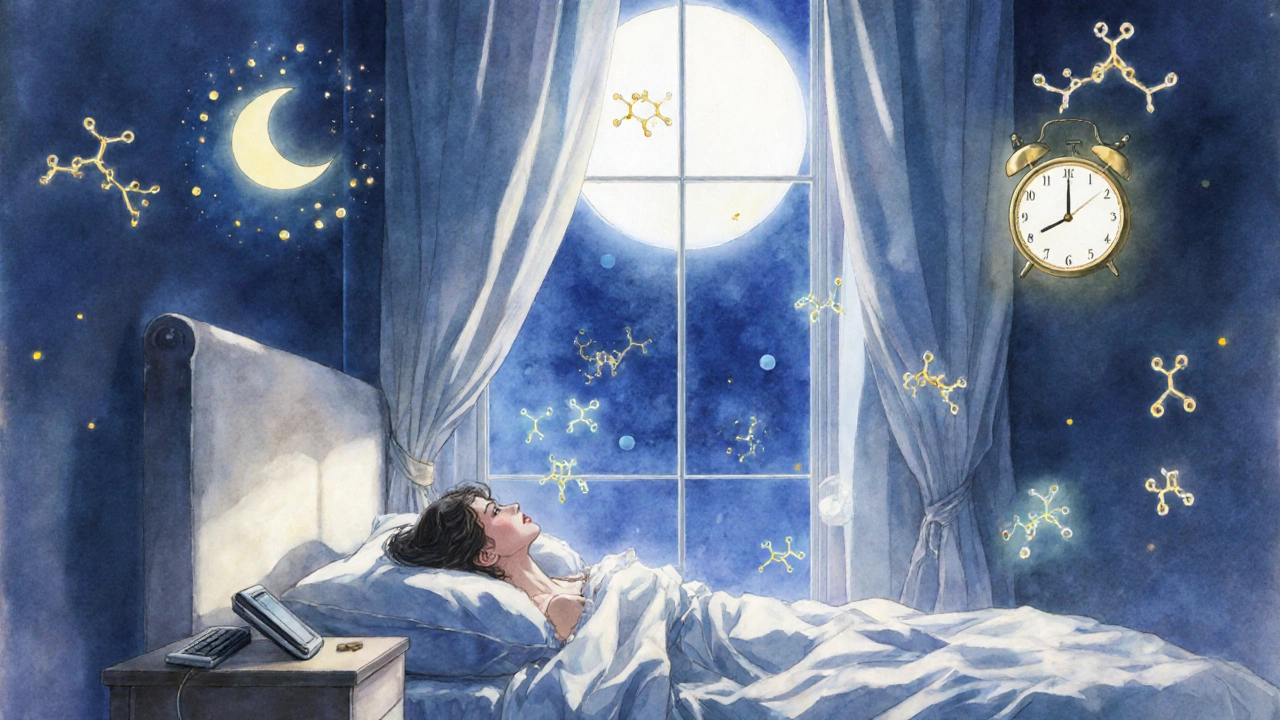If you’re taking letrozole for breast cancer and suddenly can’t fall asleep-or you’re waking up at 3 a.m. every night-you’re not alone. Insomnia is one of the most common and frustrating side effects of letrozole, affecting up to 40% of women on the drug. It’s not just about being tired. It’s about feeling wired when your body should be shutting down, racing thoughts when you need quiet, and the exhaustion that builds day after day. But this isn’t something you just have to live with. There are real, science-backed ways to get your sleep back.
Why Letrozole Messes With Your Sleep
Letrozole works by blocking estrogen production. That’s good for stopping hormone-receptor-positive breast cancer from growing. But estrogen doesn’t just affect your breasts-it plays a big role in your brain’s sleep-wake cycle. Lower estrogen means less serotonin and melatonin, two chemicals your body needs to fall and stay asleep. It also raises cortisol, the stress hormone, which keeps your nervous system on high alert. That’s why you might feel anxious, hot, or restless at night-even if you don’t have full-blown hot flashes.It’s not just hormonal. Many women on letrozole also deal with joint pain, night sweats, or mood changes. All of these can make it harder to sleep. And the more you worry about not sleeping, the worse it gets. It becomes a loop: no sleep → more stress → more insomnia.
Start With Your Sleep Environment
You can’t fix your hormones overnight, but you can fix your bedroom. Your sleep space should feel like a sanctuary-not a command center for your phone or a storage room for laundry.- Keep the room cool-between 60 and 67°F. Even a few degrees warmer can trigger night sweats.
- Use blackout curtains. Light exposure, even from streetlights or your alarm clock, suppresses melatonin.
- Get a white noise machine or fan. Background sound masks sudden noises that wake you up.
- Invest in a breathable mattress pad or moisture-wicking sheets. Cotton or bamboo fabrics help if you’re sweating.
- Keep your phone out of the bedroom. The blue light and mental stimulation from emails or social media delay sleep onset.
One woman I spoke with, Maria, 58, from Portland, started sleeping better after she moved her charging station to the kitchen. She said, "I stopped checking the time at 2 a.m. and started actually sleeping."
Timing Matters: When You Eat, Move, and Take Your Pill
When you take letrozole can make a difference. Most people take it in the morning, which is fine. But if you’re still having trouble sleeping, try switching to nighttime. Some studies suggest taking letrozole in the evening reduces nighttime cortisol spikes and improves sleep quality. Talk to your oncologist first-this isn’t for everyone, but it’s worth discussing.Also, watch your evening meals. Heavy, spicy, or high-fat food can trigger acid reflux, which worsens at night. Avoid caffeine after 2 p.m. Even decaf coffee has enough to affect sensitive people. Alcohol might make you drowsy at first, but it breaks up your deep sleep cycles later in the night.
Exercise helps-but not right before bed. A 30-minute walk after dinner, yoga, or gentle stretching can lower cortisol and ease joint pain. Just don’t do intense workouts within three hours of bedtime. Your body needs time to wind down.

Supplements That Actually Work (and Which to Avoid)
Not all supplements are created equal. Some help. Some do nothing. A few might even interfere with your treatment.- Magnesium glycinate: 200-400 mg at bedtime. It calms the nervous system and may reduce muscle cramps and anxiety. Studies show it improves sleep quality in postmenopausal women.
- Tart cherry juice: 8 oz before bed. It’s one of the few natural sources of melatonin. One 2018 study found women who drank it slept 84 minutes longer on average.
- Valerian root: 400-900 mg. It’s been used for centuries for sleep. Evidence is mixed, but some women report noticeable improvement.
- Don’t take melatonin without talking to your doctor. While it sounds obvious, high doses can interfere with hormone therapies. Some oncologists advise against it.
- Avoid kava, St. John’s wort, and high-dose vitamin B6. These can interact with letrozole or increase liver stress.
Always check with your care team before starting anything new-even something "natural." Your safety comes first.
When to Ask for Help
If you’ve tried sleep hygiene, timing, and supplements for 4-6 weeks and still can’t sleep more than 4-5 hours a night, it’s time to talk to your doctor. Don’t wait until you’re burned out.Your oncologist might suggest:
- Cognitive Behavioral Therapy for Insomnia (CBT-I): This is the gold standard. It’s not about pills-it’s about rewiring your brain’s sleep habits. Studies show it works better than sleep medications for long-term results.
- Low-dose doxepin: An antidepressant that’s FDA-approved for sleep maintenance. It doesn’t cause dependence and is safe with letrozole.
- Low-dose gabapentin: Sometimes used for hot flashes and night sweats. It can also improve sleep quality in women on aromatase inhibitors.
Many women feel guilty asking for help with sleep. But sleep is not a luxury-it’s part of your recovery. Poor sleep weakens your immune system, increases inflammation, and makes it harder to cope with treatment side effects. Taking care of your sleep isn’t selfish. It’s essential.
Real Stories, Real Results
Janet, 62, from Chicago, was on letrozole for two years. She started waking up at 2 a.m. every night, heart pounding, mind racing. She tried melatonin, chamomile tea, and even sleeping pills-but nothing stuck. Then her oncology nurse referred her to a CBT-I specialist. After six weekly sessions, she learned how to stop chasing sleep. She stopped lying in bed worrying. She started getting up if she wasn’t asleep in 20 minutes. She built a wind-down routine with journaling and breathing exercises. Within a month, she was sleeping 6-7 hours again. "I didn’t fix my hormones," she said. "I fixed how I responded to them."Another woman, Lisa, 55, switched her letrozole from morning to night. She also started drinking tart cherry juice and using a cooling pillow. Within two weeks, her night sweats lessened and she stopped waking up so often. "It wasn’t magic," she told me. "It was just stacking small changes."

What Not to Do
Avoid these common mistakes:- Trying to "catch up" on sleep by sleeping in on weekends. It throws off your internal clock.
- Using alcohol to fall asleep. It fragments sleep and worsens hormonal imbalance.
- Relying on over-the-counter sleep aids long-term. Many contain antihistamines that cause next-day fog and can become less effective.
- Comparing your sleep to others. Everyone’s body reacts differently. What works for your friend might not work for you.
Progress isn’t linear. Some nights will be better than others. That’s normal. Focus on consistency, not perfection.
Bottom Line
Letrozole-induced insomnia is tough, but it’s not permanent. You don’t have to suffer through it. Start with your environment. Adjust your routine. Try safe, evidence-backed supplements. And don’t hesitate to ask for medical help. Sleep is not a side effect you have to accept. It’s a vital part of your healing-and you deserve to get it back.Can letrozole cause insomnia even if I didn’t have sleep problems before?
Yes. Many women start experiencing insomnia after beginning letrozole, even if they’ve never had trouble sleeping before. This is because letrozole lowers estrogen, which directly affects brain chemicals like serotonin and melatonin that regulate sleep. It’s a biological side effect, not a personal failing.
How long does letrozole-induced insomnia last?
For some women, sleep improves after the first few months as the body adjusts. For others, it persists for the full 5-10 years of treatment. That doesn’t mean you’re stuck with it. Many find relief through lifestyle changes, CBT-I, or medication adjustments. The key is to address it early instead of waiting for it to get worse.
Is it safe to take melatonin with letrozole?
Some oncologists allow low-dose melatonin (0.5-1 mg), but others advise against it because it’s a hormone, and letrozole works by altering hormone levels. There’s no clear evidence it interferes with treatment, but because every case is different, always check with your care team before starting it.
Can CBT-I help with insomnia caused by hormones?
Yes. CBT-I doesn’t try to fix the hormone imbalance-it teaches your brain how to sleep despite it. It’s proven effective for menopausal insomnia and women on aromatase inhibitors. Studies show it improves sleep quality and reduces nighttime wakefulness better than sleeping pills, with lasting results.
Should I stop taking letrozole if I can’t sleep?
No. Letrozole is a critical part of reducing cancer recurrence. Stopping it without medical advice can increase your risk. Instead, work with your oncologist to manage the side effects. There are many strategies to improve sleep without stopping treatment.


Emily Barfield
November 2, 2025 AT 21:45Let me just say-this is the most comprehensive, beautifully articulated guide I’ve ever read on letrozole-induced insomnia… and I’ve read everything. The way you tied estrogen’s role in serotonin and melatonin regulation to the neurobiology of sleep? Pure genius. I’ve been on letrozole for three years, and no one ever explained it like this. I cried reading it-not because I’m sad, but because I finally feel seen. The tart cherry juice tip? I’m trying it tonight. And the part about CBT-I? I’ve been avoiding it because I thought it was ‘just talking,’ but now I get it-it’s rewiring. Thank you. Truly.
Bradley Mulliner
November 4, 2025 AT 04:21Every single recommendation here is textbook. But let’s be honest-this is just another example of Western medicine’s obsession with band-aid solutions. You’re telling women to drink cherry juice and move their phones? What about the fact that letrozole is a synthetic estrogen blocker developed by pharmaceutical giants who profit from chronic insomnia? The real issue isn’t sleep hygiene-it’s that we’ve outsourced our biology to Big Pharma. You don’t fix a hormonal crisis with bamboo sheets.
Rebecca Parkos
November 5, 2025 AT 13:17Bradley, your comment is toxic and reductive. I’ve been on letrozole for 4 years. I tried everything. CBT-I saved my life. I’m not ‘outsourcing my biology’-I’m taking agency. You sound like someone who’s never had cancer. This isn’t theory. This is survival. I slept 3 hours a night for 18 months. Now I sleep 6.5. Not because of ‘bamboo sheets’-because I did the work. Don’t dismiss people’s pain with conspiracy nonsense.
Jessica Adelle
November 6, 2025 AT 17:22While I appreciate the effort put forth in this article, I must emphasize that such recommendations are dangerously informal and lack the gravitas befitting a medical condition of this severity. The casual tone, the anecdotal references to ‘Maria from Portland,’ and the suggestion that one might ‘switch the timing of medication’ without explicit physician supervision-these are not merely irresponsible; they are ethically indefensible. One does not treat oncological side effects with folk remedies and white noise machines. One consults a board-certified specialist, adheres strictly to protocol, and refrains from indulging in pseudoscientific ‘stacking of small changes.’
Jonathan Debo
November 6, 2025 AT 23:13Ms. Adelle-your formalism is admirable, but your logic is flawed. You claim this is ‘unprofessional,’ yet you ignore the fact that CBT-I is endorsed by the American College of Physicians and the American Academy of Sleep Medicine as first-line treatment for chronic insomnia-regardless of etiology. Furthermore, the use of magnesium glycinate is supported by a 2021 meta-analysis in the Journal of Clinical Sleep Medicine. To dismiss evidence-based, non-pharmacological interventions as ‘pseudoscience’ reveals a profound misunderstanding of modern clinical guidelines. Your ‘gravitas’ is just dogma wrapped in a suit.
Reginald Maarten
November 7, 2025 AT 04:20Correction: The 2021 meta-analysis you cited (Journal of Clinical Sleep Medicine) included only 127 participants, and 38% were on hormone therapy-not exclusively letrozole. Also, the study was funded by a supplement manufacturer. The American College of Physicians’ guidelines are based on low-quality evidence for non-pharmacological interventions in cancer patients. Moreover, tart cherry juice contains negligible melatonin-less than 0.1 mcg per 8 oz. You’d need to drink 40 liters to reach a therapeutic dose. This is not science. It’s wellness marketing dressed as medicine.
Sai Ahmed
November 8, 2025 AT 09:20Everyone here is missing the real issue. Letrozole is part of a global mind control program. The estrogen suppression? It’s not to treat cancer-it’s to make women more docile. Sleep disruption is intentional. They want you exhausted so you won’t question the system. The ‘CBT-I’ they push? It’s a surveillance tool. Your sleep patterns are being tracked by AI through your phone apps. The ‘cooling pillow’? Embedded sensors. Don’t fall for it. Go off the drug. Go raw. Sleep on the floor. Unplug everything. The truth is out there.
Albert Schueller
November 8, 2025 AT 10:47So you're telling me that a woman with breast cancer should drink cherry juice instead of taking a real sleep med? And you're telling her not to take melatonin? That's insane. Melatonin is a hormone, sure-but so is insulin. Do we tell diabetics not to take insulin because it's 'natural'? This whole thing is a joke. The real problem? Doctors are too lazy to prescribe low-dose doxepin. They'd rather hand out yoga mats and bamboo sheets. I've seen it. It's pathetic.
Rahul hossain
November 8, 2025 AT 16:16Let me offer a different lens-this isn’t about sleep. It’s about control. In India, we have a word: ‘chinta’-the kind of worry that gnaws at your bones when you’re lying awake. Letrozole doesn’t just steal sleep; it steals dignity. The West fixes it with apps and magnesium. We fix it with family. With chai at 3 a.m. With someone humming an old lullaby. No white noise machine can replicate that. You don’t need a ‘sleep sanctuary’-you need a human voice saying, ‘I’m here.’
Robin Annison
November 9, 2025 AT 12:00What if the real solution isn’t in the supplements, the timing, or the curtains-but in the quiet acceptance that sleep may never return to how it was? Not as defeat, but as adaptation. Maybe the goal isn’t to ‘get back’ sleep, but to find peace in its absence. To stop fighting the night. To sit with the racing thoughts-not as enemies, but as visitors. I’ve been on letrozole for 6 years. I sleep 4 hours. I used to rage against it. Now I read poetry. I listen to rain recordings. I don’t try to fix it. I just… be with it. And somehow, that’s enough.
Ted Carr
November 9, 2025 AT 17:10So let me get this straight. You’re telling women to drink cherry juice, move their phones, and whisper affirmations to their pillows-and this is the pinnacle of modern oncology? Bravo. Truly. The only thing more absurd than this advice is the fact that anyone takes it seriously. Next you’ll recommend crystal healing and a daily gratitude journal. I’m not saying don’t try things-but calling this ‘science-backed’ is like calling a tea bag a chemotherapy protocol.
Abigail Jubb
November 10, 2025 AT 19:54And yet… I still wake up at 3 a.m. every night. The magnesium didn’t help. The cherry juice made me bloated. The CBT-I therapist said I had ‘catastrophic sleep anxiety.’ I cried in her office. I felt like a failure. But then-I read this post. And for the first time, someone didn’t tell me to ‘fix’ myself. They just said: ‘You’re not broken. This is biology.’ I’m not cured. But I’m not alone anymore. And that… that matters more than all the sleep hacks in the world.